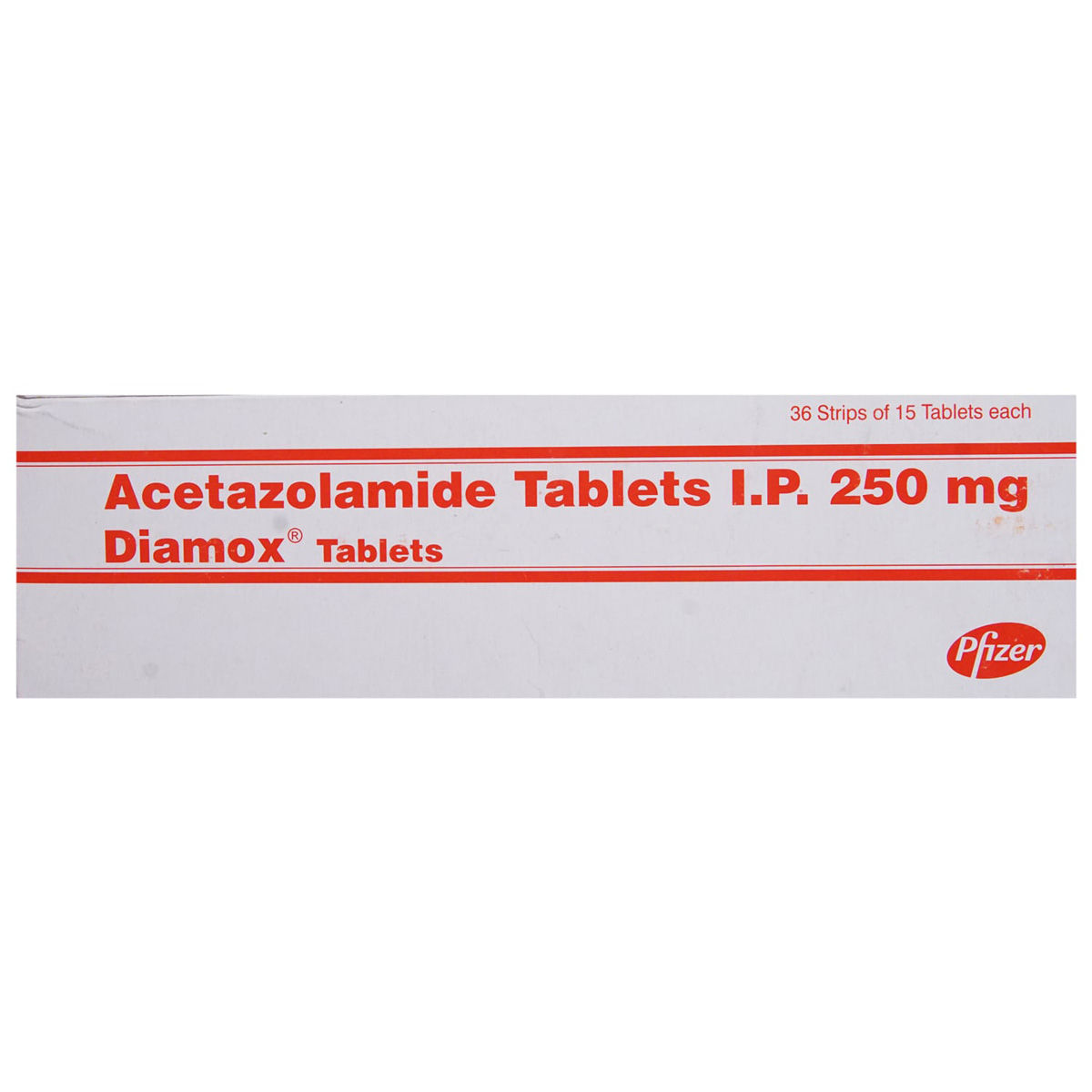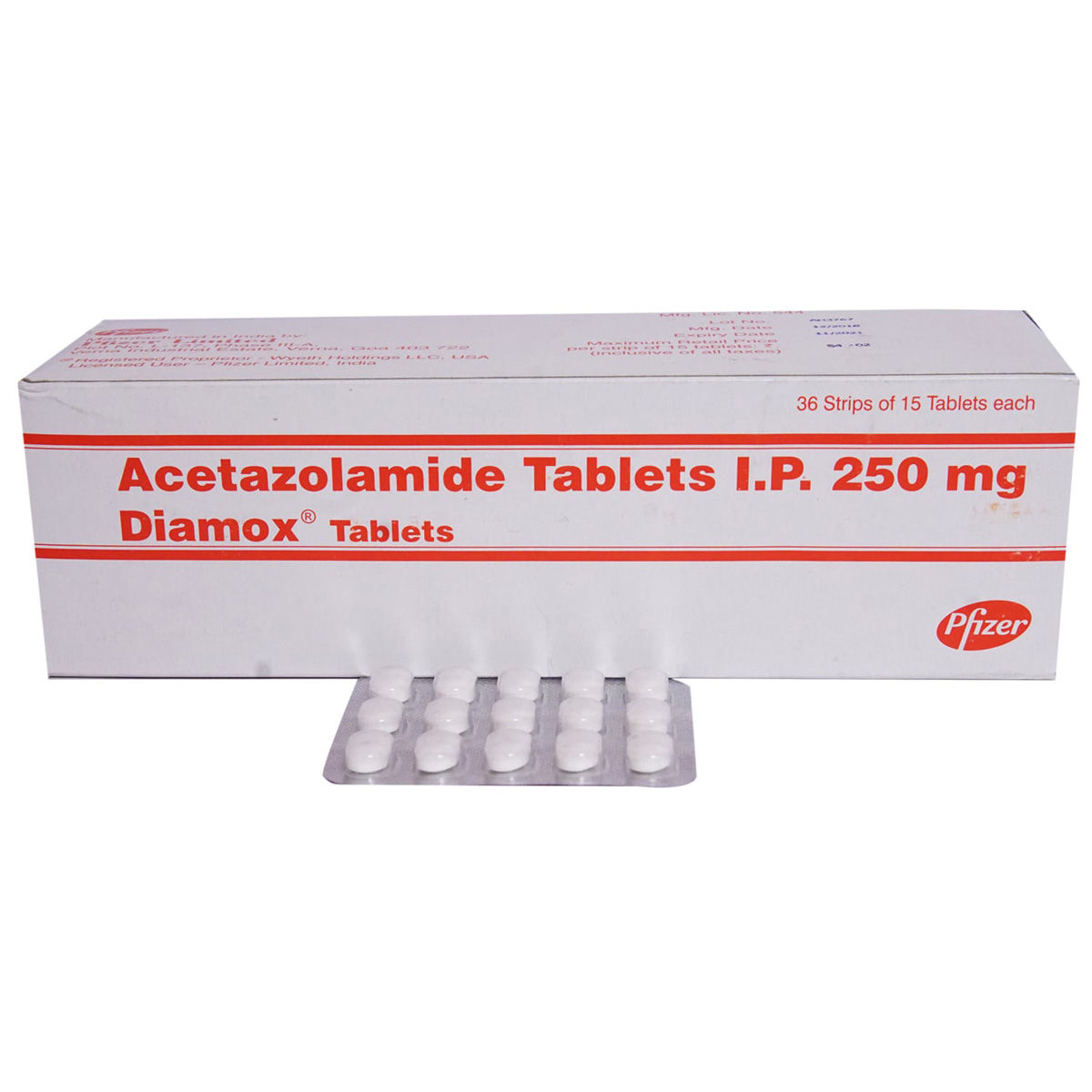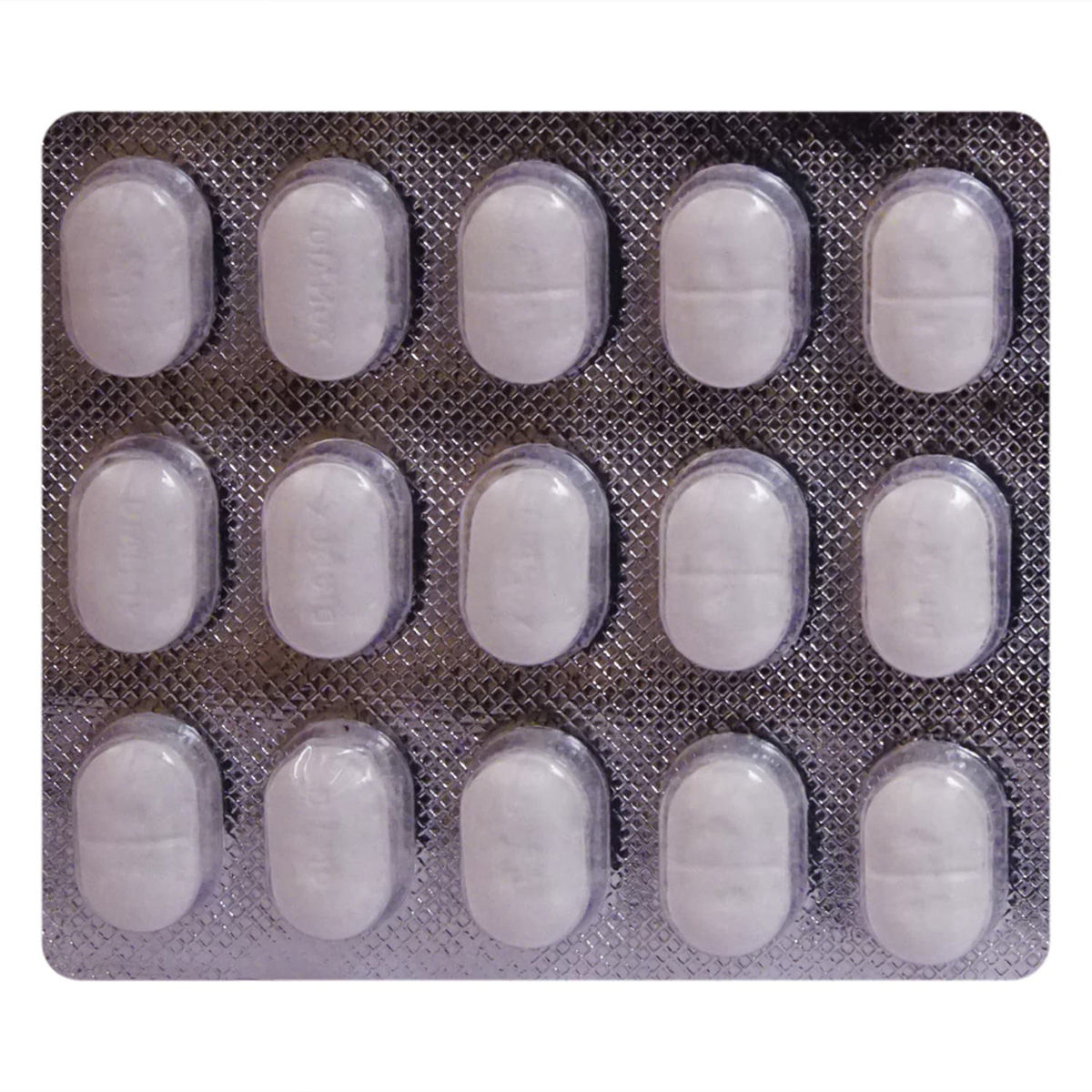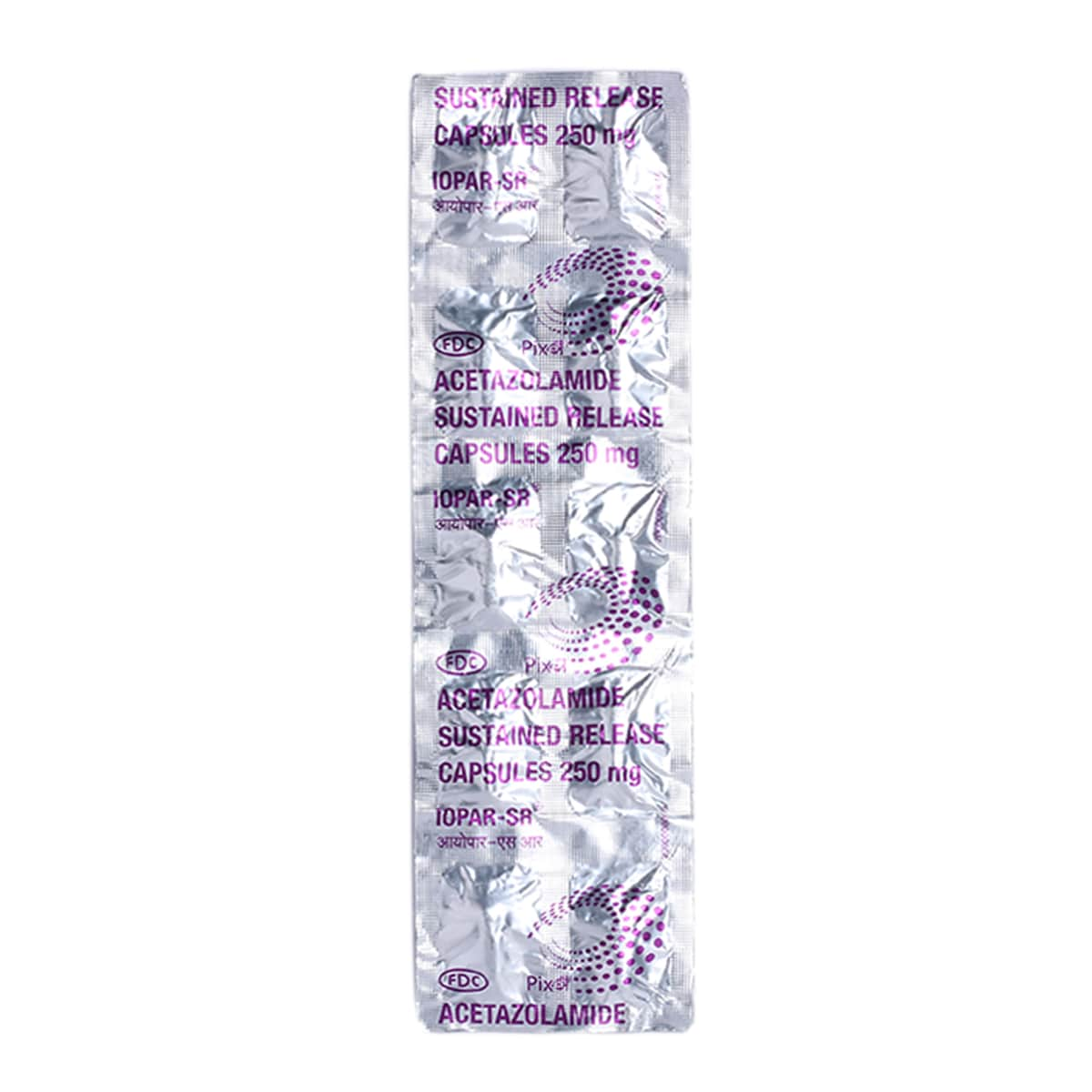Diamox Tablet 15's






₹57.2*
MRP ₹63.5
10% off
₹53.97*
MRP ₹63.5
15% CB
₹9.53 cashback(15%)
Free Delivery
With Circle membership
(Inclusive of all Taxes)
This offer price is valid on orders above ₹800. Apply coupon PHARMA10/PHARMA18 (excluding restricted items)
Know Your Delivery Time
Provide Delivery Location
Available Offers
 Prescription drug
Prescription drugWhats That
 150 people bought
150 people bought 
Secure Payment

India's Most Trusted Pharmacy

Genuine Products
Composition :
Manufacturer/Marketer :
Consume Type :
Return Policy :
Expires on or after :
About Diamox Tablet
Diamox Tablet belongs to a group of medicines called carbonic anhydrase inhibitors used to treat glaucoma, oedema (fluid retention), epilepsy, and to treat and prevent altitude/mountain sickness. Glaucoma is an eye condition that causes damage to the optic nerve due to abnormally increased pressure in the eye. Epilepsy is a disorder of the nervous system due to disturbed nerve cell activity in the brain. Fluid retention is a condition in which fluids are accumulated in the body tissues.
Diamox Tablet contains ‘acetazolamide’, which inhibits carbonic anhydrase enzyme. This inhibitory action decreases the secretion of aqueous humour, thereby lowers intraocular pressure. Diamox Tablet inhibits the carbonic anhydrase enzyme; this helps retard abnormal, excessive discharge from central nervous system neurons, thereby helps treat certain dysfunctions of the central nervous system such as epilepsy. Diamox Tablet reduces the activity of carbonic anhydrase, thereby helps lower fluid retention.
You are advised to take Diamox Tablet for as long as your doctor has prescribed it for you, depending on your medical condition. In some cases, you may experience certain common side effects, such as nausea, vomiting, diarrhoea, headache, and increased urination. Most of these side effects do not require medical attention and will resolve gradually over time. However, you are advised to talk to your doctor if the side effects persist or worsen.
Avoid taking Diamox Tablet if you are pregnant, think you are pregnant or planning for pregnancy. Consult your doctor if you are breastfeeding. Diamox Tablet is not recommended for children as safety and effectiveness have not been established. Diamox Tablet might cause dizziness and drowsiness; so, drive only if you are alert. Keep your doctor informed about your health condition and the medicines you are taking to prevent any side effects/interactions.
Uses of Diamox Tablet
Directions for Use
Medicinal Benefits
Diamox Tablet belongs to a group of medicines called carbonic anhydrase inhibitors used to treat glaucoma, oedema (fluid retention), epilepsy, and to treat and prevent altitude/mountain sickness. Diamox Tablet works by inhibiting the carbonic anhydrase enzyme. This inhibitory action decreases the secretion of aqueous humour, thereby lowering intraocular pressure. Diamox Tablet inhibits the carbonic anhydrase enzyme; this helps retard abnormal, excessive discharge from central nervous system neurons, thereby helps treat certain dysfunctions of the central nervous system, such as epilepsy. Diamox Tablet reduces the activity of carbonic anhydrase, thereby helping lower fluid retention. Diamox Tablet may also be used to treat muscle weakness/periodic paralysis and to lower the increased pressure in the areas surrounding the spinal cord and brain.
How Diamox Tablet Works
Storage
- Change positions or take a break from activity to relieve symptoms.
- Avoid postures that put a lot of pressure on just one area of the body.
- If you have vitamin deficiency, take supplements or change your diet.
- Exercise regularly like cycling, walking or swimming.
- Avoid sitting with your legs crossed.
- Clench and unclench your fists and wiggle your toes.
- Massage the affected area.
- Hydrate your body: Drink enough water to prevent dehydration and headaches.
- Calm Your Mind: Deep breathing and meditation can help you relax and relieve stress.
- Rest and Recharge: Sleep for 7-8 hours to reduce headache triggers.
- Take rest: lie down in a quiet, dark environment.
- Cold or warm compresses can help reduce tension.
- Stay Upright: Maintain good posture to keep symptoms from getting worse.
- To treat headaches naturally, try acupuncture or massage therapy.
- Over-the-counter pain relievers include acetaminophen and ibuprofen.
- Prescription Assistance: Speak with your doctor about more substantial drug alternatives.
- Severe Headaches: Seek emergency medical assistance for sudden, severe headaches.
- Frequent Headaches: If you get reoccurring headaches, consult your doctor.
- Headaches with Symptoms: Seek medical attention if your headaches include fever, disorientation, or weakness.
- Rest well; get enough sleep.
- Eat a balanced diet and drink enough water.
- Manage stress with yoga and meditation.
- Limit alcohol and caffeine.
- Physical activities like walking or jogging might help boost energy and make you feel less tired.
- Inform your doctor immediately if you experience a fever after starting a new medication.
- Your doctor may adjust your medication regimen or dosage as needed to minimize fever symptoms.
- Monitor your body temperature to monitor fever progression.
- Drink plenty of fluids, such as water or electrolyte-rich beverages, to help your body regulate temperature.
- Get plenty of rest and engage in relaxation techniques, such as deep breathing or meditation, to help manage fever symptoms.
- Under the guidance of your doctor, consider taking medication, such as acetaminophen or ibuprofen, to help reduce fever.
- If your fever is extremely high (over 103°F), or if you experience severe symptoms such as confusion, seizures, or difficulty breathing, seek immediate medical attention.
- Consult your doctor if you experience skin redness, itching, or irritation after taking medication.
- Your doctor may adjust your treatment plan by changing your medication or providing guidance on managing your erythema symptoms.
- Your doctor may recommend or prescribe certain medications to help alleviate symptoms.
- Apply cool compresses or calamine lotion to the affected skin area to reduce redness and itching.
- Stay hydrated by drinking plenty of water to help alleviate symptoms and keep your skin hydrated.
- Monitor your skin condition closely and promptly report any changes, worsening symptoms, or concerns to your healthcare provider.
- Take a balanced diet rich in protein, vitamins, and minerals.
- Increase calorie intake if necessary, especially for children with poor appetite.
- Engage in regular moderate-intensity exercise.
- Promote healthy movement patterns in children.
- Ensure adequate sleep duration by establishing a consistent sleep schedule.
- Practice relaxation techniques like deep breathing or meditation.
- Limit caffeine, alcohol and tobacco intake.
- If you experience or encounter any severe allergic reaction, stop using medication and consult the doctor right away.
- Tell your doctor about the allergic reaction, including the medication taken and any symptoms experienced.
- Your doctor will evaluate the severity of the reaction and determine the best course of action.
- To ensure a full recovery, follow your doctor's advice, attend scheduled follow-up appointments, and undergo recommended tests to monitor progress and adjust treatment as needed.
What if I have taken an overdose of Diamox Tablet
Drug Warnings
Do not take Diamox Tablet if you are allergic to any of its contents; if you have severe kidney/liver problems, chronic non-congestive angle-closure glaucoma, Addison’s disease, if you have low sodium and/or potassium levels or high chlorine levels. Inform your doctor if you have lung problems, kidney stones, electrolyte imbalance, adrenal gland problems, diabetes, or heart problems. Avoid taking Diamox Tablet if you are pregnant, think you are pregnant or planning for pregnancy. Consult your doctor if you are breastfeeding. Diamox Tablet is not recommended for children as safety and effectiveness have not been established. Diamox Tablet might cause dizziness and drowsiness; so, drive only if you are alert. Diamox Tablet might make your skin sensitive to sunlight; therefore, wear protective clothing and sunscreen whilst going out.
Drug-Drug Interactions
Drug-Drug Interactions
Login/Sign Up
Co-administration of Cisapride with Diamox Tablet can increase the risk of an irregular heart rhythm that may be serious.
How to manage the interaction:
Taking Diamox Tablet with Cisapride lead to an interaction, please consult a doctor before taking it. Consult a doctor immediately if you experience any symptoms such as dizziness, lightheadedness, fainting, or fast or pounding heartbeats. Do not discontinue the medications without consulting a doctor.
Co-administration of Droperidol can enhance the effects of Diamox Tablet can increase the risk of an irregular heart rhythm that may be serious.
How to manage the interaction:
Although there is a possible interaction between Diamox Tablet and Droperidol, you can take these medicines together if prescribed by a doctor. If you have any of these symptoms, it's important to contact a doctor right away: dizziness or lightheadedness, fainting, difficulty breathing, heart palpitations, weakness, feeling sleepy or confused, muscle pain, or feeling nauseous or vomiting. Do not stop using any medications without talking to a doctor.
Co-administration of Diamox Tablet with Topiramate may increase the risk of metabolic acidosis (elevated levels of acid in the blood) and kidney stone formation.
How to manage the interaction:
Although there is a possible interaction between Diamox Tablet and Topiramate, you can take these medicines together if prescribed by a doctor. If you experience symptoms of metabolic acidosis such as tiredness, loss of appetite, irregular heartbeat, trouble thinking clearly, and rapid breathing, contact a doctor immediately. Also, if you experience signs or symptoms of kidney stones, such as sudden back pain, abdominal pain, and blood in the urine, or if you have decreased sweating or a fever, contact your doctor immediately. Do not stop using any medications without consulting a doctor.
Co-administration of Diamox Tablet with Pimozide may increase the risk of irregular heart rhythm.
How to manage the interaction:
Although there is a possible interaction between Diamox Tablet and Pimozide, you can take these medicines together if prescribed by a doctor. If you develop sudden dizziness, lightheadedness, fainting, or fast or pounding heartbeats during treatment with pimozide, contact a doctor immediately. Also, inform your doctor if you experience signs of electrolyte disturbance such as weakness, tiredness, drowsiness, confusion, muscle pain, cramps, nausea, or vomiting. Do not discontinue the medication without consulting a doctor.
Coadministration of Aspirin with Diamox Tablet may cause side effects.
How to manage the interaction:
Although there is a possible interaction between aspirin and Diamox Tablet, you can take these medicines together if prescribed by a doctor. However, if you experience symptoms such as ringing in your ears, headache, nausea, vomiting, dizziness, confusion, hallucinations, or rapid breathing, fever, and seizure, please contact a doctor. Do not stop using any medications without talking to a doctor.
Coadministration of amiodarone with Diamox Tablet may raise the risk of an abnormal heart rhythm.
How to manage the interaction:
Even though Amiodarone and Diamox Tablet interact, they can be used if prescribed by a doctor. If you have heart issues or electrolyte imbalances, you may be at higher risk. If you experience sudden dizziness, lightheadedness, fainting, shortness of breath, weakness, drowsiness, confusion, muscle pain, nausea, vomiting, or rapid heartbeat, get medical attention. Do not discontinue any medications without consulting a doctor.
Co-administration of Diamox Tablet with Dronedarone may increase the risk of irregular heart rhythm.
How to manage the interaction:
Although there is a possible interaction between Diamox Tablet and Dronedarone, you can take these medicines together if prescribed by a doctor. If you develop sudden dizziness, lightheadedness, fainting, or fast or pounding heartbeats during treatment with Dronedarone, contact a doctor immediately. Also, inform your doctor if you experience signs of electrolyte disturbance such as weakness, tiredness, drowsiness, confusion, muscle pain, cramps, nausea, or vomiting. Do not discontinue the medication without consulting a doctor.
Co-administration of Salicylic acid with Diamox Tablet can increase the risk of adverse effects.
How to manage the interaction:
Taking Diamox Tablet with Sodium salicylate together can possibly result in an interaction, but it can be taken if a doctor has advised it. If you have any of these symptoms, like ringing in your ears, headache, feeling sick, throwing up, feeling dizzy, confused, seeing things that aren't there, breathing fast, having a fever, or having a seizure, make sure to call a doctor right away. Do not stop using any medications without talking to a doctor.
Co-administration of Diamox Tablet with Dofetilide may increase the risk of irregular heart rhythm.
How to manage the interaction:
Although there is a possible interaction between Diamox Tablet and Dofetilide, you can take these medicines together if prescribed by a doctor. If you develop sudden dizziness, lightheadedness, fainting, or fast or pounding heartbeats during treatment with dofetilide, contact a doctor immediately. Also, inform a doctor if you experience signs of electrolyte disturbance such as weakness, tiredness, drowsiness, confusion, muscle pain, cramps, nausea, or vomiting. Do not discontinue the medication without consulting a doctor.
Co-administration of Diamox Tablet with Ziprasidone may increase the risk of irregular heart rhythm.
How to manage the interaction:
Although there is an interaction between Diamox Tablet and Ziprasidone, they can be taken together if prescribed by a doctor. If you develop sudden dizziness, lightheadedness, fainting, contact a doctor immediately. Do not discontinue any medication without talking to a doctor.
Drug-Food Interactions
Drug-Food Interactions
Login/Sign Up
Diet & Lifestyle Advise
GLAUCOMA:
Avoid intake of baked foods such as cakes, cookies, doughnuts or fried items such as French fries and stick margarine as these foods may worsen glaucoma and damage the optic nerve.
Limit coffee intake as it may increase pressure in the eye. Replace coffee with green tea.
Avoid exercises such as any position where the head is lower than the body, like an inverted yoga pose, as it may increase pressure in the eye. Doing selective exercises is advised for glaucoma patients.
EPILEPSY:
Exercising regularly helps in maintaining weight and improving overall health.
Rest well, and get plenty of sleep.
Avoid smoking and alcohol consumption.
Meditation and yoga can help lower stress, decrease pain sensitivity and improves coping skills.
Have a seizure response plan to help those around you know what to do.
Prepare your living area; small changes may help reduce the risk of physical injury during a seizure.
Understand what triggers seizures and try reducing or avoiding them.
Please pay attention to overall health, as it can help reduce seizure activity.
Install an alarm or emergency device to get assistance during a seizure attack.
FLUID RETENTION:
Limit salt intake.
Consume foods rich in magnesium, such as nuts, dark chocolate, whole grains, and leafy vegetables.
Include foods rich in vitamin B6, such as potatoes, bananas, meat, and walnuts.
Potassium reduces water retention, therefore, include potassium-rich foods such as avocados, tomatoes, and bananas.
Avoid refined carbohydrates.
Walking can help reduce fluid retention.
Habit Forming
Therapeutic Class
Diamox Tablet Substitute

Iopar-SR Capsule 10's
by Others
₹4.77per tabletAcetamide 250 mg Tablet 10's
by Others
₹3.83per tabletIomide 0.25 gm Tablet 10's
by AYUR
₹3.83per tabletAvva SR 250 mg Capsule 10's
by Others
₹4.73per tabletAvva Tablet 10's
by Others
₹3.83per tablet
Product Substitutes
Alcohol
Caution
Avoid or limit alcohol consumption as it might lead to increased drowsiness.
Pregnancy
Unsafe
Diamox Tablet belongs to pregnancy category C. Avoid using Diamox Tablet if you are pregnant, think you are pregnant or planning for pregnancy. Please consult your doctor if you have any concerns regarding this.
Breast Feeding
Caution
Consult your doctor if you are breastfeeding; your doctor will decide if Diamox Tablet can be taken by breastfeeding mothers or not.
Driving
Caution
Diamox Tablet might cause dizziness and drowsiness. Drive or operate machinery only if you are alert.
Liver
Caution
Dose adjustment may be needed. Avoid taking Diamox Tablet if you have severe liver problems. Please consult your doctor if you have any concerns regarding the usage of Diamox Tablet in patients with liver impairment.
Kidney
Caution
Dose adjustment may be needed. Avoid taking Diamox Tablet if you have/had severe kidney problems. Please consult your doctor if you have any concerns regarding the usage of Diamox Tablet in patients with kidney impairment.
Children
Unsafe
Diamox Tablet is not recommended for children as safety and effectiveness have not been established.
FAQs
Diamox Tablet used to treat glaucoma, oedema (fluid retention), epilepsy, and to treat and prevent altitude/mountain sickness.
Diamox Tablet is used as an adjunct in the treatment of epilepsy. It inhibits the carbonic anhydrase enzyme; this helps retard abnormal, excessive discharge from central nervous system neurons, thereby helps treat seizures.
Diamox Tablet promotes diuresis of abnormal fluid retention due to congestive heart failure. Fluid retention or oedema is the accumulation of fluid in the body tissues.
Diamox Tablet helps reduce the severity and duration of symptoms of altitude/mountain sickness, such as headache, stomach upset, dizziness, drowsiness, fatigue, and shortness of breath.
To treat your condition effectually, continue taking Diamox Tablet for as long as your doctor has prescribed it. Do not be reluctant to speak with your doctor if you experience any difficulty while taking Diamox Tablet .
Diamox Tablet might make your skin sensitive to sunlight. Avoid unnecessary and prolonged exposure to sunlight or tanning beds. Wear protective clothing, sunscreen and sunglasses whilst going out.
Diamox Tablet inhibits carbonic anhydrase enzyme. This inhibitory action decreases the secretion of aqueous humour, thereby lowering intraocular pressure and helping treat glaucoma.
Yes, you can take Diamox Tablet after cataract surgery if it is prescribed by your eye doctor. Diamox Tablet is sometimes used prophylactically to prevent increased intraocular pressure (IOP) after cataract surgery. So, if your doctor recommends it, it's safe to use as directed.
The common side effects of Diamox Tablet include nausea, vomiting, diarrhoea, headache, and increased urination. Most of these side effects are mild and temporary, and they often resolve on their own without requiring medical attention. However, if the side effects persist or worsen over time, it's important to consult your doctor.
Diamox Tablet works by inhibiting the carbonic anhydrase enzyme, which has several effects on the body. It decreases aqueous humor secretion, lowers intraocular pressure, and treats glaucoma. It also reduces abnormal neuron discharge in the central nervous system, helping treat epilepsy. Additionally, it decreases fluid retention by reducing carbonic anhydrase activity, making it effective in treating oedema.
Certain individuals may not take Diamox Tablet , including those with end-stage kidney or liver problems, eye conditions, electrolyte imbalances, and allergies to any components present in Diamox Tablet . Additionally, if you're pregnant, breastfeeding, or planning pregnancy, it's essential to discuss your options with your doctor. They will help you make an informed decision and ensure your safety. Before starting Diamox Tablet , sharing your medical history with your doctor is crucial to ensure it's safe for you.
Diamox Tablet is effective when used as directed by your doctor. It's used to treat glaucoma, fluid retention (oedema), epilepsy (seizures), and mountain sickness. While it's effective, you may experience common side effects like nausea, vomiting, diarrhoea, headache, and increased urination. Most of these side effects are mild and temporary, but if they persist or worsen, be sure to talk to your doctor.
Be sure to consult your doctor before using Diamox Tablet ! It is important to follow their advice and complete the treatment course as recommended. Stopping suddenly or prematurely may lead to decreased effectiveness or other issues. Your doctor will help you determine when it's safe to stop using Diamox Tablet . Consult them before making any changes to your treatment.
Take the missed dose as soon as you remember unless it's almost time for your next dose. In this case, skip the missed dose and take your next dose at the regular time. Never take a double dose to make up for a missed one.
Country of origin
Manufacturer/Marketer address
Customers Also Bought
Disclaimer
Author Details
We provide you with authentic, trustworthy and relevant information
Reference
- https://www.medicines.org.uk/emc/files/pil.2785.pdf
- https://www.drugs.com/mtm/acetazolamide.html
- https://www.medindia.net/doctors/drug_information/acetazolamide.html
- https://medlineplus.gov/druginfo/meds/a682756.html
- https://www.hpra.ie/img/uploaded/swedocuments/dcab200a-a221-43b4-9d71-5354d3cbc36a.pdf
- https://www.medsafe.govt.nz/consumers/cmi/d/Diamox.pdf
Recommended for a 30-day course: 2 Strips


















.jpg?tr=q-80)





